American Association of Oriental Medicine (AAOM) suggests FDA is Interfering Unlawfully with the Practice of Chinese Herbal Medicine
- Email This
- Share Link
The AAOM recently released a statement criticizing FDA regulation of herbs.
In April 2004 the FDA passed a rule which blocked the use of Ephedra, a popular herbal stimulant which has been used for weight loss, increased energy, and enhanced athletic performance.
Ephedra, also called Ma huang, is a naturally occurring substance derived from plants. Its principal active ingredient is ephedrine, which when chemically synthesized is regulated as a drug. But FDA has determined that Ephedra presents an unreasonable risk of illness or injury. It has been linked to significant adverse health effects, including heart attack and stroke.
While the FDA aims to regulate the use of Ephedrine Alkaloid supplements, the AAOM claims that this regulation does not apply to Ephedra in traditional Chinese herbal medicines, which is generally mixed with other herbs and administered in much lower doses for medicinal purposes.
In response to the recent regulation of Ephedra, the AAOM released a statement on March 9, 2005: "The rule banning ephedrine alkaloids specifically exempts "traditional Chinese herbal remedies." Yet ever since the ban went into effect in April of 2004, the FDA has blocked "traditional Chinese herbal remedies" from being distributed in the United States. We regard this action as falling outside the jurisdiction of the FDA's and as a direct interference with our practice rights."
According to the recent statement, the AAOM agrees with the FDA ruling to regulate ephedrine alkaloids, which have been show to have more potential health hazards than benefits. Even though the new rule makes a specific exception for ephedra in "Traditional Chinese Herbal Remedies" the AAOM claims that the FDA's regulations impose on the practice of Chinese Herbal Medicine. The AAOM protests the "numerous instances where the FDA has overstepped its authority by preventing the distribution of "traditional Chinese herbal remedies." Ultimately, the AAOM claims that "The Federal government has authority over the products of medicine, but not over the practice of medicine."
Proper regulation of the quality of health supplements and medicines is necessary to protect the safety of consumers. In a case such as this, the challenge is to regulate the potentially dangerous products without preventing the continuation beneficial medical practices.
Sources:
http://www.fda.gov/oc/initiatives/ephedra/february2004/
http://www.aaom.org/default.asp?pagenumber=48211
By Laura Stevens
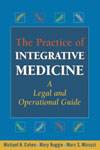 The Practice of Integrative Medicine: A Legal and Operational Guide is now available from Springer.
The Practice of Integrative Medicine: A Legal and Operational Guide is now available from Springer.
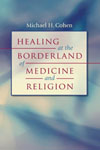 One of the transformations facing health care in the twenty-first century is the safe, effective, and appropriate integration of
One of the transformations facing health care in the twenty-first century is the safe, effective, and appropriate integration of
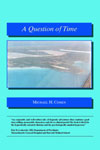 Michael H. Cohen's novel A Question of Time is about consciousness. Gabriel Goodman takes a vacation from his law firm
Michael H. Cohen's novel A Question of Time is about consciousness. Gabriel Goodman takes a vacation from his law firm
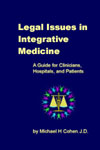 Legal Issues in Integrative Medicine: A Guide for Clinicians, Hosptials, and Patients by Michael H. Cohen (National Acupuncture Foundation,
Legal Issues in Integrative Medicine: A Guide for Clinicians, Hosptials, and Patients by Michael H. Cohen (National Acupuncture Foundation,
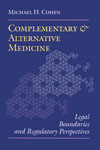 In Complementary and Alternative Medicine: Legal Boundaries and Regulatory Perspectives, Michael H. Cohen breaks new ground in putting together the
In Complementary and Alternative Medicine: Legal Boundaries and Regulatory Perspectives, Michael H. Cohen breaks new ground in putting together the
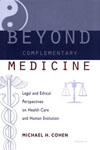 In Beyond Complementary Medicine, Michael H. Cohen goes deeper into the legal, ethical, and regulatory aspects of integrating complementary and
In Beyond Complementary Medicine, Michael H. Cohen goes deeper into the legal, ethical, and regulatory aspects of integrating complementary and
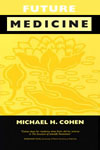 Future Medicine by Michael H. Cohen is an investigation into the clinical, legal, ethical, and regulatory changes occurring in our
Future Medicine by Michael H. Cohen is an investigation into the clinical, legal, ethical, and regulatory changes occurring in our
 What happens when a Wall Street lawyer, steeped in Judaism, enters an interfaith seminary, engages mystically, and connects with disincarnate
What happens when a Wall Street lawyer, steeped in Judaism, enters an interfaith seminary, engages mystically, and connects with disincarnate